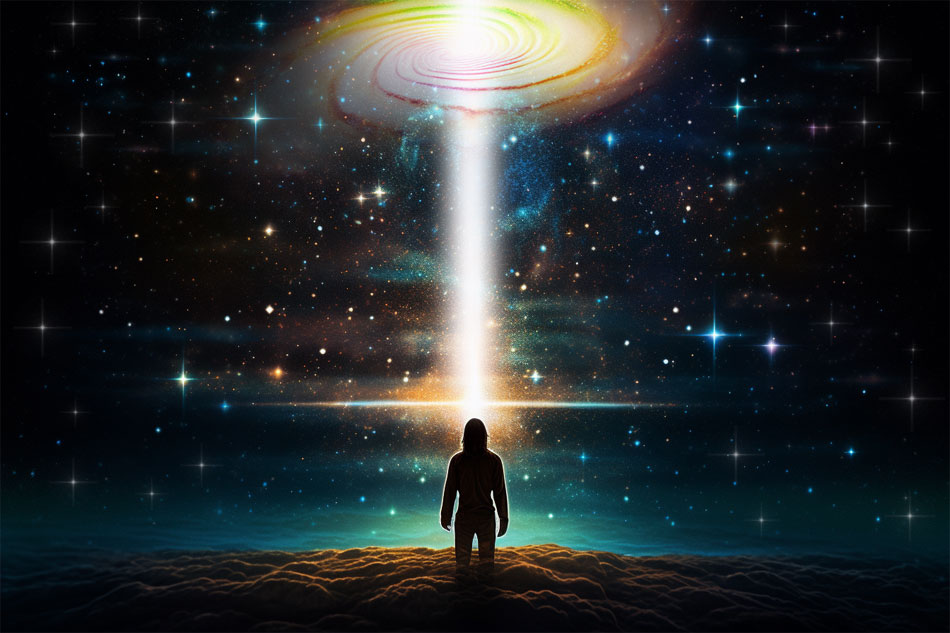Development Of The Greater Self
 by Manly P. Hall
by Manly P. Hall
Reincarnation is controlled primarily by the law of karma, a manifestation of the universal law of cause and effect. The personality is subject to the various laws governing thought, emotion, energy, and form. For this reason it is never possible for the personality to escape the consequences set up by actions in the various substances of which [the many reincarnated] bodies are composed.
In the Gnostic school the permanent entity is called Anthropos, or the man. The incarnating ego which is emanated by the entity is designated Anthropos Son of Anthropos, the man that is the son of the man. The ego is called by the Neo-Platonists the “summit of the personality,” the self which endures for the span of one life.
In Gnosticism the cycle of necessity or reincarnation is set forth clearly as a process of emanations. The permanent entity emanates the impermanent ego. The ego in turn emanates its bodies. Through these bodies the ego contacts phenomenal experience which it preserves in memory, which memory-record ultimately is returned to the permanent entity through the process of decarnation or death. Thus the anthropos, or oversoul, the greater self, grows through the experiences of these lesser natures which it emanates. The permanent entity is slowly coming of age by a process requiring hundreds of millions of years.
The entity itself never incarnates. It merely projects the forms from itself. In Tibetan art the permanent entity is frequently depicted as seated upon a lotus throne in a posture of contemplation. Below this throne the messengers of the meditating one, small figures mounted on racing horses, are galloping to the four corners of the world. Each of the horsemen represents an incarnation or a cycle of experience. In the midst of the racing horses the entity itself remains; impersonal, detached, in no way perturbed by the confusion of its personalities.
In Christian terminology the entity is appropriately referred to as the “Father in Heaven.” In Eastern theology it is termed the father-mother, because it is the true parent of the personality and each man’s personal god. Prayer is the effort of an enlightened personality to contact its own source; not some abstract god in space, but its own peculiar god, its own transcendental entity. The permanent self or entity is therefore the god of the wise, to be approached with reverence and with the offerings of virtue and enlightenment.
The law of karma is the law of cause and effect applied to the personalities emanating from permanent entities; it is the force constantly impelling personalities to higher courses of action. It works through the principle of inadequacy. That which is insufficient cannot survive. There is therefore a constant urge toward equilibrium and progress. According to the Zohar: “Unbalanced forces perish in the Void.” This explains the disappearance of races, types, and kinds, and also why all that is imperfect must fade from the earth.
All perfection is relative. Ultimates are beyond the conception of personalities. The law of karma is forcing life along the path of evolution by making present inadequacy unbearable. This is the fundamental impulse by which the universe is forcing the gradual but inevitable adjustment between personality and entity. When this adjustment is complete the entity no longer emanates personalities as we know them, but emanates higher and, to us, intangible and unknowable types.
The principal laws governing reincarnation, that is, the aspects of karma identified with rebirth, are as follows:
1. The length of the life cycle of the personality varies with the degrees of attunement between the personality and the permanent entity. In the primitive savage the complete personality cycle, including physical life and after-death personal consciousness, may not exceed a hundred years. This is because there is little individualized emotion and practically no reflective thought.
A philosopher such as Plato or Pythagoras, whose mental accomplishments were prodigious and who lived on a very high level of personal conduct, may have a personality cycle of ten thousand years; or due to difficulty in finding an appropriate environment for the succeeding personality, even greater periods of time may pass.
The reasonable expectancy for the normal person is a personality continuity of from eight hundred to twelve hundred years. There are exceptions to this rule, however. The permanent entity, making use of a higher discretion than ordinary mortals are capable of, may project a new personality at will, or whenever an appropriate environment presents itself.
2. The Mendelian law of heredity as applied to human beings is a similarity rather than an actual fact. The entity projecting a personality selects an environment suitable to the spiritual achievements, mental, emotional, and physical requirements, and karmic responsibilities which are to be exemplified in the new personality. Racial differentiations, body refinement, and predisposition to certain peculiarities of temperament and health, are important factors. Therefore the son resembles the father not because he has inherited from his parents, but because his father’s personality was the principal element in a chemistry which offered certain specialized opportunities to the incarnating personality.
It is now generally acknowledged that the majority of diseases cannot be inherited, but rather a deficiency may be inherited which will cause susceptibility. This deficiency is due to the fact that the incoming personality, depending upon the parents for the substance of its physical body, must assume whatever chemical deficiencies are peculiar to this substance.
The childhood environment is a powerful determining factor in the life of the personality. This environment is due to the temperaments, characteristics, qualities, and abilities of the parent. Also such factors as wealth and poverty become forces in character. As a result of the entity’s selection of a location for the personality’s incarnation, the entity assures itself that the personality will pass through certain experiences peculiarly necessary to the balanced development of the entity. Thus the entity grows up by benefiting from the experiences of its personalities.
3. Under certain conditions of sickness or stress the personality may become mentally unbalanced. There are also cases of mental subnormality, including the moron and the idiot. Physical deformities also are quite possible and must be considered in relation to the personality’s experience necessity.
Insanity, as a maladjustment between the mental nature and the other parts of the personality chain, has no permanent effect upon either the ego or the permanent entity. The only detrimental element is the loss of experience over a period of years. But this in turn is karmic, and is part of the necessary spiritual experience of the entity.
The moron and the idiot are usually the result of physical subnormalities which prevent the ego from functioning through the body. In other words, the body has its emotional and vital principles, but because the body fabric is not sensitive to mental impulses normalcy cannot be expected.
Accidents and deformities are frequently checks on personalities that would otherwise develop uncontrollable and undesirable traits. The accident is a direct result of karma, either of the personality itself or of the entity. As the sole purpose of the personality is to enrich the permanent entity, such peculiarities as deformity, stuttering, and other lesser abnormalities are all media for the working out of the karmic inadequacies of the entity.
4. The law of alternation of sexes in rebirth is necessary for the spiritual completeness of the entity. This law is subject to numerous modifications, but in substance holds true over a long period of time. The evidence of the working of this law is the steady breaking down of the extreme difference between the sexes. The cave man and the fluttery female are rapidly disappearing. Men are increasing their interest in music and art and other cultural things anciently regarded as distinctly feminine; while woman’s sphere has increased to include business, politics, and professions previously considered distinctly masculine. When this increased sphere of influence is achieved without the loss of fundamental impulse we see the evidence of universal law bringing all life toward equilibrium. The only way we can learn to live is by living, and through hundreds of lives we gradually dignify the art of living. In this way the entity perfects itself in the mysteries of physical existence in which the entity has no actual contact, depending entirely upon its personalities for the development of itself.
 The Books say well my Brothers! each man’s life
The Books say well my Brothers! each man’s life
The outcome of his former living is;
The bygone wrongs bring forth sorrows and woes,
The bygone right breeds bliss.
That which ye sow ye reap. See yonder fields!
The sesamum was sesamum, the corn
Was corn. The Silence and the Darkness knew!
So is a man’s fate born.
He cometh, reaper of the things he sowed,
Sesamum, corn, so much cast in past birth;
And so much weed and poison-stuff, which mar
Him and the aching earth.
If he shall labor rightly, rooting these,
And planting wholesome seedlings where they grew,
Fruitful and fair and clean the ground shall be,
And rich the harvest due.
–The Light of Asia
Excerpt from Reincarnation: The Cycle Of Necessity
Posted in Other Topics, Reincarnation, Spiritualitywith comments disabled.





